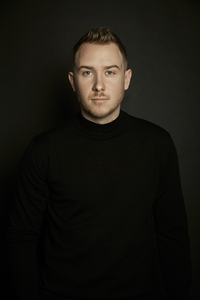Tristan Horx
How do different generations interact and communicate with one another - and how has the corona crisis changed that? Tristan Horx speaks at TEDxMedUniGranz 2020.
Tristan Horx in quotations
“Had you ever thought before that you could worry about finding a job after graduating? This is probably the first time. The younger generation will probably have a lower standard of living than their parents for the first time. This is a novelty since World War II."
"In the economy, it is mainly medium-sized companies that will survive because they are more agile and can react quickly to change. Thus, a kind of evolutionary selection takes place."
"The trend towards sustainability that has already existed will be further strengthened."
"If we want to have massive economic growth again, we need a new breakthrough technology, e.g. quantum computing or AI technology (artificial intelligence)."
"(Yes) you could do so much with big data and stop the whole pandemic. But we have learned that big data - all the data that is collected about us - is used against us for consumption purposes. If we take this potential instead of stimulating senseless consumption, there would be so much potential in new technologies like blockchain."
Source: Katja Hoffmann / International Schoof of Management
Does the future have to be more sustainable?
Katja Hofmann, Stuttgart, an "expert for meaningful marketing" and lecturer at the International School of Management (ISM), had the students discuss with Tristan Horx in an online lecture in April 2020 the fundamental question of whether and how it can be done the coronavirus pandemic will change lives and the economy.
For this purpose, the students at ISM developed their own theses and questions on the four future scenarios of the Horx Future Institute - from pessimistic to optimistic - and discussed them with Tristan Horx.
The following questions were discussed in the online conversation:
- What is Tristan Horx's work currently like and how has it changed due to corona?
- Will there be drastic changes after corona - or is the creature of habit, man, going back "to the old"?
- Which future scenario does Tristan Horx believe in?
- Can a pandemic be prevented in the future?
- Which values will gain in importance?
- Aren't the 4 scenarios of the Horx Future Institute actually influencing people to think and act in a certain direction?
- Could one person steer people into a positive future with a consistently positive scenario?
- How will corona change the economy?
Read the full interview here (German).
In an interview with schauclub.at with his son and junior futurist Tristan Horx, trend and future researcher Matthias Horx looks at the changes in the world caused by the corona virus.
Abiut Tristan Horx
Tristan Horx was born in 1993 to Matthias Horx and Oona Horx-Strathern. Matthias Horx is a German publicist who also founded the Zukunftsinstitut (Future Institute) - Frankfurt, Vienna and Berlin. Oona Horx-Strathern is British, author and daughter of the author Paul Strathern.
Tristan Horx studied cultural and social anthropology at the University of Vienna and did a voluntary service in Sri Lanka before starting at the Zukunftsinstitut, where he publishes the trend study "Generation Global". Today Tristan Horx is a German-English speaker. He has been giving lectures on globalization, mobility and generation since 2017. Since 2018 he has lectured in the trend research course at the SRH University of Heidelberg. Horx is also curator of the podcast Treffpunkt Zukunft (The Meeting Point Future).
Moonshot für Controller
In seinem Vortrag spricht Tristan Horx auch das "Moonshot"-Denken an. Als Moonshot bezeichnet man ein visionäres Projekt, dessen Ziel die Realisierung von ehrgeizigen, bahnbrechenden Ideen ist. Dabei sind kurzfristig weder Rentabilität noch Nutzen zu erwarten.

